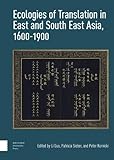Ecologies of Translation in East and South East Asia, 1600-1900 / ed. by Patricia Sieber, Li Guo, Peter Kornicki.
Material type: TextPublisher: Amsterdam : Amsterdam University Press, [2022]Copyright date: ©2022Description: 1 online resource (326 p.)Content type:
TextPublisher: Amsterdam : Amsterdam University Press, [2022]Copyright date: ©2022Description: 1 online resource (326 p.)Content type: - 9789048554119
- online - DeGruyter
| Item type | Current library | Call number | URL | Status | Notes | Barcode | |
|---|---|---|---|---|---|---|---|
 eBook
eBook
|
Biblioteca "Angelicum" Pont. Univ. S.Tommaso d'Aquino Nuvola online | online - DeGruyter (Browse shelf(Opens below)) | Online access | Not for loan (Accesso limitato) | Accesso per gli utenti autorizzati / Access for authorized users | (dgr)9789048554119 |
Frontmatter -- Table of Contents -- List of Figures and Tables -- Introduction. Scriptworlds, Vernacularization, and Shifting Translation Norms -- 1 On Not Being Shallow. Examination Essays, Songbooks, and the Translational Nature of Mixed-Register Literature in Early Modern China -- 2 A Faithful Translation. Tsūzoku sangokushi, the First Japanese Translation of Sanguozhi yanyi -- 3 Romance of the Two Kingdoms. Okajima Kanzan’s Chinese Explication of ‘The Annals of Pacification’ (Taiheiki engi) -- 4 Speaking the Sinitic. Translation and ‘Chinese Language’ in Eighteenth-Century Japan -- 5 ‘Body Borrowed, Soul Returned’ An Adaptation of a Chinese Buddhist Miracle Tale into a Vietnamese Traditional Theatrical Script -- 6 ‘Out of the Margins’ The Western Wing Glossarial Complex in Late Chosŏn and the Problem of the Literary Vernacular -- 7 Vernacular Eloquence in Fiction Glossaries of Late Chosŏn Korea -- 8 Imagined Orality. Mun Hanmyŏng’s Late Nineteenth-Century Approach to Sinitic Literacy -- 9 Linguistic Transformation and Cultural Reconstruction. Translations of Gorky’s ‘Kain and Artem’ in Japan and China -- Index
restricted access online access with authorization star
http://purl.org/coar/access_right/c_16ec
This ground-breaking volume on early modern inter-Asian translation examines how translation from plain Chinese was situated at the nexus between, on the one hand, the traditional standard of biliteracy characteristic of literary practices in the Sinographic sphere, and on the other, practices of translational multilingualism (competence in multiple spoken languages to produce a fully localized target text). Translations from plain Chinese are shown to carve out new ecologies of translations that not only enrich our understanding of early modern translation practices across the Sinographic sphere, but also demonstrate that the transregional uses of a non-alphabetic graphic technology call for different models of translation theory.
Mode of access: Internet via World Wide Web.
In English.
Description based on online resource; title from PDF title page (publisher's Web site, viewed 01. Dez 2022)


